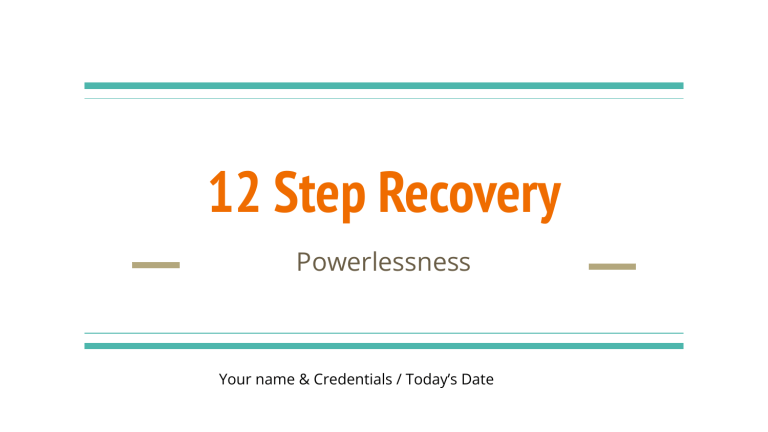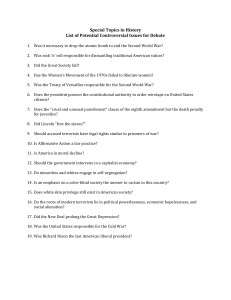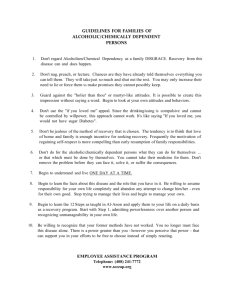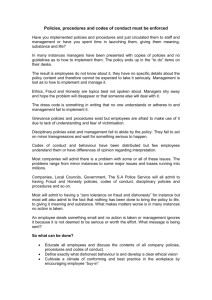
12 Step Recovery Powerlessness Your name & Credentials / Today’s Date Today’s Group Agenda ● ● ● ● ● ● Mindfulness Check -In’s Content Worksheet/Activity Discussion Closing Mindfulness Either facilitate 1-2 minutes of mindfulness or play short guided meditation Check In’s ● ● Name and Pronouns Ice breaker (Rose, Bud, Thorn, Describe your feelings today as the weather, etc) What is Powerlessness? Admitting powerlessness means admitting that no amount of trying or practicing or self-control is going to change the way that drugs or alcohol affect your brain, thus this is the first step in a lifelong journey of recovery. Definition of powerlessness: 1. 2. 3. Devoid of strength or resources, powerless victims Lacking the authority or capacity to act, was powerless to help. Being without the power to do something or prevent something from happening What does powerlessness look like to you Powerlessness means that you are not confused in any way that for you, alcohol is poison. Being powerless does not mean you are weak. Quite the contrary, being able to admit that you can’t drink, makes you self-aware and honest. Knowing your limitations helps you to succeed and accomplish your goals. What are some things you can be powerless over? ● ● ● ● ● ● ● ● ● ● ● Smoking Drinking alcohol Taking drugs Overeating Working too hard Sexuality being a man or woman Need for intimacy Emotional Cycles Body changes Genetics Changes in appearance and metabolism What is the Principle of Step One? The principle behind Step One is Honesty and when we take a closer look at this step, it just makes sense: the first step asks us to take an honest look at our lives and tell the truth. For many starting out in recovery, this may be the first time in forever that they actually have done so. The thing about Step One is, it can only be complete if we admit to our innermost selves, rather than to any other, that we are powerless over our drug of choice and that our lives have become unmanageable. Many of us were used to lying or omitting kep facts about our lives where others were concerned: we have invented excuses for tardiness, explained away drained bank accounts and cast blame on others Honesty Depending on our upbringing and values, we may have learned to avoid being completely long before addiction took over our lives. When honesty brought nothing but misery and punishment, we learned to lie. When we were exhorted to take control of our lives, do it right the first time, succeed at whatever we put our minds to, it became harder and harder to admit to mistakes and to not having all the answers. “When we could look at the man or woman in the mirror and admit that we had lost control over our addiction, and that our lives were suffering as a result, we had truly taken Step 1” Unmanageability: Examples ● ● ● ● ● ● ● ● ● ● You’re reluctant to attend family functions or any other social obligations where drinking will not be part of the agenda. You are able to drink or use drugs recreationally but eventually you always slip back into destructive habits. You go out intending to drink or use a set amount but find that when you run out, you need more. You’ve done something you would never otherwise do. (Drinking driving, risky behavior) You are neglecting household duties like laundry and dirty dishes You’re struggling to hold a job or bouncing from job to job as your lateness, absenteeism and attitude You struggle to pay bills on time. You don’t eat a proper diet, sleep irregularly or too much/not enough, Your relationships and friendships have begun to suffer as a result of your addiction. You feel moody, irritated, anxious or depressed, or a combination of all three. This leads you to isolate and take solace even further in drugs and/or alcohol. Worksheet/Activity Step One Reading from Alcoholics Anonymous Big Book Discussion 1. 2. 3. 4. Why do you think the 12-Step journey begins with Powerlessness? Can you admit you are powerless? And if not, why? What upbringing did you experience, when it came to honesty? What does unmanageability look like for you? Closing Inform Clients of 5 minutes remaining. Ask if there are any additional thoughts anyone would like to share or questions they may have. **End group 10 minutes prior to scheduled time to allow transition to the next group.


